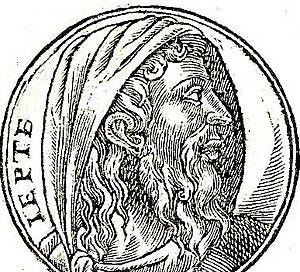Judges Chapter 12 Bible Study
Jephthah and his gang kill the Ephraimites who can't say Shibboleth
This is part twelve of my Judges study. Read the previous parts here and watch for part thirteen coming on December 18.
After Jephthah’s battle with the Ammonites in the previous chapter, men from the tribe of Ephraim travelled to his residence and demanded to know why he had not called them to participate in the battle. They were extremely offended by this and threatened to burn down his house with him in it. Jephthah explained that he had called them to help him previously but they would not deliver him from the power of the Ammonites.
Then, the Ephraimites insulted the Gileadites by calling them “Ephraimite fugitives in the territories of Ephraim and Manasseh,” so Jephthah and the Gileadites went to war with the Ephraimites. The Gileadites then captured the fords of the Jordan to prevent the Ephraimites from crossing over. When someone came to cross the river, the Gileadites would ask whether or not this person was an Ephraimite and if the person denied it, he would be required to pronounce the word “Shibboleth.” As the Ephraimites could not pronounce the word correctly, anyone who said “Sibboleth” was killed on the spot, which amounted to the deaths of forty-two thousand. Shibboleth is a word meaning “ear of grain” or “torrent of water.”1
Jephthah was buried in a city of Gilead after his six years of judgeship. The text’s frequent mentions of him being a Gileadite seem to indicate that his authority was confined to that general area and not all of Israel as is sometime assumed.2 Obviously, Jephthah was an extremely flawed person who made many mistakes over the course of his time in power. His violent tendencies led him to commit numerous brutal acts as we have seen in this chapter and the one before. As the book of Judges is arranged from best to worst, Jephthah was the second-to-worst major judge and is absolutely not a character to emulate or admire.
After the conclusion of Jephthah’s story, three minor judges are briefly described. Izban from Bethlehem judged for seven years and had thirty sons and thirty daughters. It is also noted that he arranged marriages for each of his children with people from outside his tribe. This would have been a political move designed to secure alliances and broaden Izban’s influence in the surrounding area, showing his selfish tendencies.3 The Bethlehem mentioned here is probably the northern one from Joshua 19:15 instead of the one near Jerusalem.4 He is also one of only two judges said to have had a daughter and his thirty daughters contrast starkly with Jephthah’s one.5
Elon from Zebulun judged for twelve years. The meaning of his name refers to some type of tree, and nothing else is known about him aside from his burial place in Aijalon of Zebulun.6 Next, Abdon, meaning “little servant,” the son of Hillel from Pirathon judged for eight years.7 His forty sons and thirty grandsons are said to have each ridden on a donkey, a line that sounds incredibly similar to the statement of Jair’s thirty sons riding donkeys in Judges 10. Again, owning this many donkeys was a sign of financial and economic prosperity as donkeys were a sign of being well-off.
Thanks all for reading! Unfortunately, there is not much recorded in Judges 12, so this post is significantly shorter than last month’s Bible study. However, more interesting things are coming as we will get into the Samson story starting in December as that is perhaps the most often referenced and talked-about part of Judges.
BIBLIOGRAPHY
Block, Daniel I. “Judges.” In Joshua, Judges & Ruth, edited by John H. Walton, 198-451. Zondervan Illustrated Bible Backgrounds Commentary Series. Grand Rapids, MI: Zondervan, 2009.
Boda, Mark J. “Judges.” In Judges, Ruth, edited by Tremper Longman III and David E. Garland, 30-347. The Expositor’s Bible Commentary Series. Grand Rapids, MI: Zondervan, 2012.
Evans, Mary J. Judges and Ruth. Tyndale Old Testament Commentaries Series. Downers Grove, IL: InterVarsity Press, 2017.
McCann, J. Clinton. Judges. Interpretation: A Bible Commentary for Preaching and Teaching Series. Louisville, KY: John Knox Press, 2011.
Way, Kenneth C. Judges and Ruth. Teach the Text Commentary Series. Grand Rapids, MI: Baker Books, 2016.
Webb, Barry G. The Book of Judges. The New International Commentary on the Old Testament Series. Grand Rapids, MI: William B. Eerdmans Publishing Company, 2012.
Younger Jr., K. Lawson. Judges and Ruth. The NIV Application Commentary Series. Grand Rapids, MI: Zondervan, 2002.
Way, Judges and Ruth, 153.
Evans, Judges and Ruth, 130.
Younger, Judges and Ruth, 268.
Evans, Judges and Ruth, 132.
Younger, Judges and Ruth, 267.
Younger, Judges and Ruth, 268.
Boda, “Judges,” 240.






The Bible church I attend in Dallas just went through Judges in October and November. We ended the weekend before the election. So many lessons from this book I had never known. Thanks for this. I’ll read all of your posts. On this book as it greatly intrigued me.